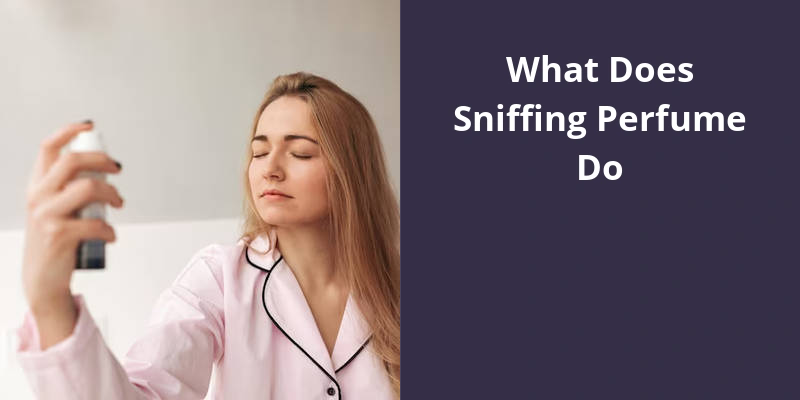Have you ever wondered what happens when you take a whiff of someone else's perfume? Well, the effects can vary depending on the individual and their specific sensitivities. Sniffing perfume may seem like a harmless and enjoyable act, but for those who suffer from allergies or asthma, it can quickly turn into a discomforting and potentially hazardous experience. It isn’t just an issue of personal preference or hygiene, as excessive fragrance can actually be a detrimental factor in social interactions, causing migraines or triggering allergic responses in those nearby. Thus, understanding the consequences of sniffing perfume is crucial for both fragrance enthusiasts and those who may be negatively impacted by it’s lingering presence.

How Do I Know if I’m Allergic to Perfume?
If you suspect that you may be allergic to perfume, there are a few mild symptoms that you can look out for. One common indicator of a perfume sensitivity is sneezing, especially if the perfume is sprayed near your face and airways such as your nose, mouth, and throat. This is because the strong scent can irritate your nasal passages and trigger a sneezing response.
This can occur when the fragrance molecules come into contact with the sensitive tissues inside your nasal cavity, causing an allergic reaction. Additionally, you might experience nasal mucus dripping down the back of your throat, which is known as postnasal drip. This can further lead to a persistent cough as the mucus irritates your throat.
Headaches can also be a mild symptom of a perfume sensitivity. Furthermore, perfume allergies can lead to nausea, as the strong fragrances can cause a sense of discomfort and unease in certain people.
It’s important to note that these symptoms can vary in severity between individuals and may be influenced by the specific ingredients used in the perfume.
How to Identify and Avoid Perfume Irritants
- Read and understand the ingredients list
- Look for potential irritants such as alcohol, artificial fragrance, and colorants
- Avoid perfumes that contain known allergens like linalool, limonene, and benzyl benzoate
- Do a patch test on a small area of your skin before applying the perfume all over
- Consider opting for fragrance-free or hypoallergenic perfumes
- Choose natural or organic perfumes made with botanical extracts
- Avoid spraying perfumes directly on your skin; instead, try spraying them on your clothing or hair
- Keep track of any potential reactions or sensitivities to certain perfumes
- Consult with a dermatologist or allergist if you’ve a history of perfume allergies
- Consider using fragrance-free or unscented products in your daily skincare routine to minimize exposure to irritants
Perfumes, though they may be pleasing to the senses, can sometimes cause discomfort and irritation to the nose. This is due to the chemicals present in perfumes that can irritate the nasal passages and potentially trigger allergic reactions. To minimize the risk of nasal allergies caused by perfumes, there are a few precautions one can take.
Why Does Perfume Irritate My Nose?
Many individuals find that perfume can irritate their noses. This is due to the chemicals present in fragrances that can trigger an allergic reaction or irritate the nasal passages. In some cases, people may have a specific sensitivity or allergy to certain chemicals commonly found in perfumes, such as benzyl alcohol or linalool.
To prevent nasal allergies caused by perfumes, it’s essential to choose fragrance-free products. These products are formulated without added scents, reducing the risk of irritation. Additionally, it’s advisable to test fragrances before using them. Apply a small amount on your wrist or inner arm and wait for a few hours to see if any adverse reactions occur.
Using natural fragrances can also be a solution for individuals prone to nasal irritation. Natural perfumes are made from plant-based materials and essential oils. They often have a milder scent, which may be more tolerable for those with sensitivities.
Furthermore, it’s best to avoid spraying perfumes in public places. The concentrated smell can be overwhelming for others, potentially causing discomfort or triggering allergies. If you must wear perfume, consider applying it to your clothes or hair rather than directly on the skin to minimize the risk of irritation.
Source: Can your perfume cause nasal allergy? Tips to prevent it
Perfumes have been around for centuries, with their enticing scents captivating and alluring people across cultures. Beyond their aesthetic appeal, perfumes offer numerous benefits that go beyond mere fragrance. Wearing perfume can boost attraction levels, enhance mood, showcase personal style, and even have potential health benefits. Additionally, the right scent can improve one’s overall smell, create lasting memories, and instill a sense of confidence.
What Are the Benefits of Perfumes?
Wearing perfume daily can provide a range of benefits for individuals. One of the biggest advantages of wearing perfume is that it boosts attraction levels. The right scent can make a person more alluring and appealing to others. This can be particularly beneficial in social or romantic situations, as it can increase confidence and signal desirability.
In addition to it’s allure, perfume has the power to enhance mood. Certain scents have been scientifically proven to uplift and improve ones mood.
Perfume wearers are often seen as style-savvy individuals. Just like fashion accessories, perfume adds an extra layer of sophistication and attention to detail to ones overall look.
Some essential oils used in perfumes have antibacterial properties that can help kill germs and prevent infections. Additionally, pleasant smells can alleviate stress and promote relaxation, which can have a positive impact on overall well-being.
It’s no secret that a pleasant scent can cover any unpleasant body odors and leave a lasting impression on others. It can make individuals feel fresh and confident throughout the day.
Perfume has a unique ability to create lasting memories. The olfactory system is closely linked to the hippocampus and amygdala, the brain regions responsible for storing emotions and memories. Therefore, certain scents can evoke vivid memories and transport individuals back to specific moments in their lives.
Lastly, wearing perfume can boost confidence. A good fragrance can make individuals feel more put-together and ready to take on the world. It acts as a personal signature that instills self-assurance and leaves a lasting impression on others.
The Psychology Behind Scent and It’s Impact on Emotions
Scent has a profound influence on our emotions and can evoke powerful memories and feelings. Our olfactory system, responsible for our sense of smell, is directly connected to the brain’s limbic system, which processes emotions and memories.
When we smell a particular fragrance, it triggers a cascade of reactions in our brain, releasing neurotransmitters that can alter our mood and emotional state. Certain scents, such as lavender or chamomile, have calming effects, while others like citrus or peppermint can invigorate and uplift us.
Perfumes and fragrances are often used to enhance our mood and create specific emotional states. For example, wearing a comforting and familiar scent can provide a sense of security and nostalgia, while wearing a sensual fragrance can boost confidence and enhance attraction.
Furthermore, scent can also play a role in shaping our perception of others. Studies have shown that certain aromas can influence our judgment of a person’s attractiveness and likability, highlighting the powerful link between scent and social interactions.
In summary, the psychology behind scent reveals that it’s the ability to affect our emotions and memories, enhance our mood, and shape our social interactions. Sniffing perfume can unlock these effects, providing us with sensory experiences that have a profound impact on our well-being.
Perfume has long been known for it’s ability to influence our mental and physiological states, ultimately impacting our lives in significant ways. From boosting our mood and confidence to enhancing our energy levels, the power of fragrance goes beyond just smelling pleasant. These elements are fundamental in shaping our personal growth, influencing our behavior, attitude, and actions. Moreover, perfume can even aid in learning new skills, ultimately leading to a greater overall sense of well-being and a higher quality of life.
How Does Perfume Impact Your Life?
Perfume has always been a significant aspect of our lives, impacting us in ways we may not even realize. The power of scent is remarkable; it’s the ability to evoke strong emotions, trigger vivid memories, and create lasting impressions. The simple act of sniffing perfume can instantly transport us to a different time and place, conjuring up images and emotions associated with particular scents.
The impact of perfume on our mental state is undeniable. It’s the ability to uplift our mood, boost our confidence, and even increase our energy levels. A whiff of a favorite fragrance can instantly lift our spirits, making us feel more positive and optimistic. This can have a ripple effect on other aspects of our lives, as a positive mindset often leads to better performance and interactions with others.
Furthermore, perfume can also play a role in personal growth. The confidence and sense of self that comes with wearing a signature scent can help individuals to develop a stronger sense of identity. It can also contribute to the development of personal style and presentation, which can have a profound impact on how one is perceived by others. The olfactory experience of wearing perfume can be a powerful tool in expressing oneself and leaving a lasting impression on others.
In addition to it’s impact on mental and emotional well-being, perfume can also influence our physiological state. Certain scents have been found to have relaxing properties and can help to alleviate stress and anxiety. Others can invigorate and energize, providing a much-needed boost to our energy levels. This can be particularly beneficial in enhancing productivity and focus, whether it be at work or in other areas of life.
The impact of perfume on our lives goes far beyond just smelling nice. This can have a profound impact on various aspects of our personal growth, including behavior, attitude, actions, and the acquisition of new skills. So the next time you reach for that bottle of perfume, remember the power it holds in enhancing your overall well-being and quality of life.
The Role of Perfume in Cultural and Social Rituals.
- Perfume has been used throughout history in various cultural and social rituals.
- In ancient Egypt, perfume was a key part of religious ceremonies and burials.
- In many traditional Eastern cultures, perfume is used during weddings and other important celebrations.
- Perfume is often used in religious rituals and ceremonies in churches, temples, and mosques.
- In some cultures, perfume is believed to have mystical and healing properties.
- Perfume can be used to enhance personal grooming and hygiene practices.
- In social settings, perfume is often worn to make a statement or create a favorable impression.
- Perfume can evoke emotions and memories, making it a powerful tool in cultural and social contexts.
- Certain perfumes are associated with specific cultures and traditions.
- Perfume bottles and packaging can be viewed as works of art and cultural artifacts.
Is it too much if you can smell your own cologne? In general, if you can detect the aroma of your perfume or cologne without consciously trying to, it could be a sign that you’ve applied too much. The purpose of fragrance is to enhance your personal scent, not overpower it. So, finding the right balance is key.
Is It Too Much if You Can Smell Your Own Cologne?
Is it too much if you can smell your own cologne? While a pleasant aroma can boost confidence and leave a lasting impression, it’s important to strike a balance when it comes to fragrance application. When the scent of your cologne becomes overpowering to yourself, it’s likely to also overwhelm those around you.
Instead of enhancing your personal style and leaving a positive impression, a heavy application can have the opposite effect. It’s important to remember that fragrance should complement your presence rather than command attention.
To strike the right balance, it’s advisable to apply perfume or cologne in small amounts and in strategic areas such as the wrists, neck, or behind the ears. This allows for a subtle diffusion of scent and ensures that it remains an enjoyable experience for both you and those around you. Remember, a well-applied fragrance is meant to be discovered, not announced.
How to Choose the Right Fragrance for Different Occasions: Discussing Different Types of Fragrances and When It Is Appropriate to Wear Them, Such as Light and Fresh Scents for Daytime and Stronger Scents for Evening Events.
- Light and fresh scents for daytime
- Stronger scents for evening events
- Citrus or floral fragrances for casual occasions
- Woody or spicy fragrances for formal events
- Sweet and fruity scents for summer or beach outings
- Musky or oriental fragrances for romantic dates
- Consider the season and weather when choosing a fragrance
- Avoid wearing heavy or overpowering scents in enclosed spaces
- Experiment with samples before buying a full bottle
- Remember that personal preference is key in choosing a fragrance
Conclusion
While it can be a source of delight and evoke memories, it’s important to consider the potential negative consequences. For those with allergies or asthma, the inhalation of someone else's fragrance can trigger uncomfortable or potentially dangerous reactions. It’s essential to exercise caution and moderation when engaging in the olfactory experience of perfumes, respecting the boundaries and sensitivities of others.





